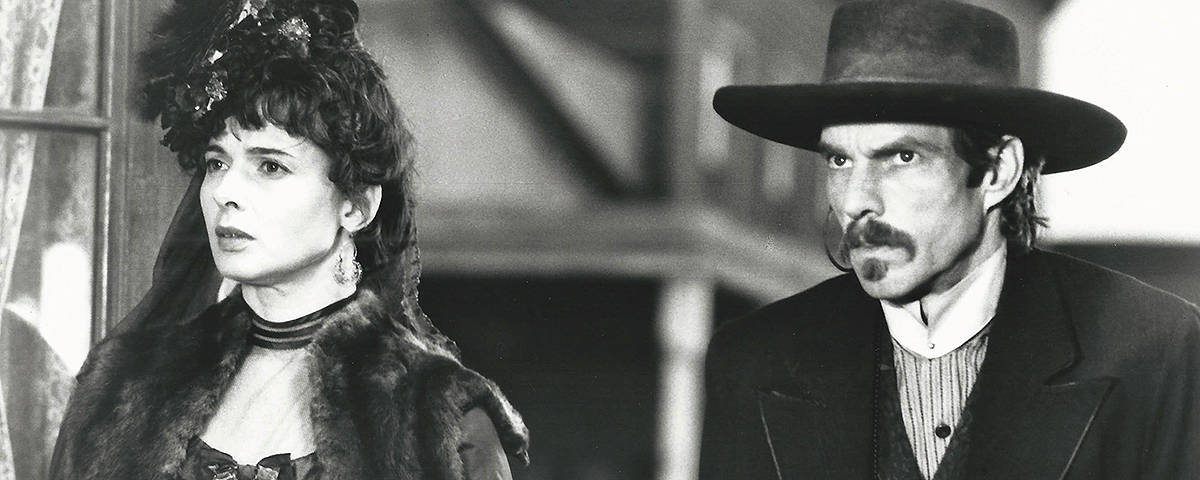Doc & Kate: Soul Mates?
As I write these words, spring is in the air. But as you read this, it’s already time to bid farewell to summer and embrace the fall. Such is the speed of life, especially after you reach a certain age. Whatever that age is, John Henry “Doc” Holliday likely didn’t reach it. After graduating from the Pennsylvania College of Dental Surgery in 1872, contracting tuberculosis and taking his practice west, he cut his teeth on gambling and frontier adventure. And Wild West aficionados are glad he did. Doc died at age 36, which might have been longer than he expected, though historians have disputed the notion of a fatalistic Holliday consciously placing himself in danger. Regardless, he packed a lot of living and more than a few knives and firearms into those three-plus decades.
He is best known, of course, for his friendship with Wyatt Earp and participation in the October 1881 gunfight near the O.K. Corral in Tombstone, Arizona Territory—interconnected circumstances long played up in books and movies. “The story of the friendship of Wyatt Earp and Doc Holliday is the stuff of legend,” historian Gary Roberts wrote in his December 2012 Wild West feature “Brothers of the Gun: Wyatt and Doc.” “Neither man’s story can be told without the other.” True enough, but Holliday would have other clashes and other friends during his six post-Tombstone years. Doc’s saloon life in Leadville, Colo., and Butte, Mont., where a local newspaper reported he “made a great many warm friends among the sporting fraternity,” are the subject of Peter Brand’s “Holliday in Montana.” In Doc’s last years Wyatt apparently didn’t go out of his way to visit his old friend, though they did have one last meeting in a Denver hotel in June 1886, according to Earp’s wife, Josie. “When I heard you were in Denver,” Doc reportedly told Wyatt, “I wanted to see you once more.” Holliday admitted his days were numbered, and Wyatt was moved to tears at their parting. Doc died on the morning of Nov. 8, 1887, at the Hotel Glenwood in Glenwood Springs, Colo.
But this is spring for me (and it was for you), so let’s not dwell on sad partings and the autumns and winters of our lives or those of our Western heroes. The Earp-Holliday friendship was, Roberts noted, rooted in courage and loyalty and “largely imperious to the opinions of others.” In the 19th century, he adds, such “close male relationships were considered normal, manly and even ennobling.” And, of course, female relationships were also part of the picture. Wyatt had Josie (“Sadie” to him), and before that his Urilla and his Mattie (to name only the ones considered “wives”). Doc once had his own Mattie—a first cousin (though whether any romance was involved has long been debated) who went on to become a nun and served as the inspiration for the character of Melanie Hamilton in Margaret Mitchell’s novel Gone With the Wind. Holliday moved on to the not necessarily endearing Kate Elder. In this issue of Wild West Roberts provides fresh insight into the stormy off-and-on relationship between Doc and “Big Nose” Kate, who met in St. Louis in 1872 and lived as husband and wife in Tombstone in spring 1881.
In the 1930s Kate (the onetime Mary Katherine Horony) spoke about the late Doc but also suggested she had had a thing for—if not a fling with—bad boy John Ringo, demonstrating she still had much to hide about her early days. She and Doc saw little of each other after 1881, but—at least according to her—at his request she came to see him in the summer of 1887 when he was dying in Glenwood Springs. Many unanswered questions remain as to how well (or not) they treated one another and whether they were soul mates, ill-matched lovers or something in between. I prefer to think of what they had together as a frontier love story—after all, it is spring…or used to be. WW
Wild West editor Gregory Lalire wrote the 2014 historical novel Captured: From the Frontier Diary of Infant Danny Duly. His article about baseball in the frontier West won a 2015 Stirrup Award for best article in Roundup, the membership magazine of Western Writers of America.





